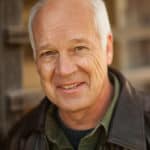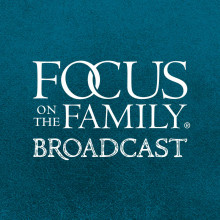Dr. Del Tackett: And we have to go back and understand the vast expense, if you wanna put it in those words, that was represented by what Jesus did and the sacrifice that he made because of his love for us and if we continue to go back and understand just how much we have been forgiven, then that should drive our love for those who live next door.
John Fuller: Well that’s Dr. Del Tackett, challenging all of us to think more deeply about our faith and our life and what God wants to accomplish through each one of us. Dr. Tackett is our guest today on Focus on the Family. Your host is Focus president and author Jim Daly and I’m John Fuller.
Jim Daly: John, I think everybody at some point in their life will have big questions like who am I, where am I going, why am I here. Maybe in your 20s, that’s pretty common, that was my experience.
End of Preview
John: Mm-hmm.
Jim: Maybe in your 60s and 70s as things are wrapping up. The point is hopefully you’ll get to that point where you’re asking those questions because those are ultimately the most important questions and, uh, today we’re gonna talk with Dr. Del Tackett, uh, wonderful apologist and really a big believer in the fact that God is working in and around you every day, are you noticing? I think as Christians, I think it’s important for us to come back to these questions about life and purpose and God’s plan over and over again because we wanna continue to grow in our faith and, uh, grow in that connection with the Lord and we want to be careful to live according to his will and it’s exciting to have Del back at the table, former colleague here at Focus on the Family. I’m looking forward to the discussion.
John: Mm-hmm. Uh, very popularly known, uh, as the host and greater of The Truth Project, a very comprehensive world view video series that was produced by Focus on the Family and Dr. Tackett is certainly a well-known speaker author and professor and, uh, Del, you’ve continued to producer many other world view projects for both TV and video and, uh, those have impacted more than 15 million people, Jim.
Jim: Hm.
John: So we’re honored to have him here today to talk about his latest series, The Engagement Project.
Jim: Del, welcome back.
Dr. Tackett: Thank you, Jim, it is good to be back. John, a pleasure to be here with you all.
Jim: Well we should start, uh, by The Truth Project, just mention that beginning and that’s something we did together.
Dr. Tackett: Sure.
Jim: Uh, what did it accomplish, what were you trying to do with The Truth Project?
Dr. Tackett: Mm-hmm. Well The Truth Project was really a part of what the Lord had kind of laid his hand on me (laughs), uh, kind of radically turned my life around is to, uh, my call was to get the body of Christ healthy and, uh, vibrant, being light in salt and I was convinced that the first thing that had to happen was we had to build a comprehensive, systematic biblical world view in the hearts and minds of the body of Christ. And so that’s what the, The Truth Project was meant to do.
Jim: I remember that. You, you were teaching that at the institute that we had for college students at the time and, uh, I remember, uh, we went in and watched it and we came out going, “Okay, everybody needs to see this.”
Dr. Tackett: (laughs)
Jim: So, it was hard to compress all that information. That was a semester long class, right?
Dr. Tackett: Oh, it was. Well, even more than that-
Jim: Yeah.
Dr. Tackett: I’d been teaching the seminary, uh, 300 contact hours and so throwing stuff out was the hardest thing I’ve ever done in my life. (laughs)
Jim: (laughs) There’s always a good battle between the editors-
Dr. Tackett: Yes.
Jim: And the content expert. Let’s move to The Engagement Project, your newest, uh, project.
Dr. Tackett: Mm-hmm.
Jim: What is The Engagement Project and with that, what are you trying to accomplish?
Dr. Tackett: Right. Well, I think this is the next step. So after you have a biblical world view, um, the question is what do we do with that? I mean, is it sufficient just to have that knowledge in our brain or has God called us to something, uh, higher than that? And I think that’s what The Engagement Project is to do is to help cast the vision to people that God has entrusted the primary work of the Kingdom to the common every day Christian family and for them to catch that vision and recognize that yes, we can have a good world view, but if it doesn’t impact the people who live around us, uh, then we’re not doing what the Lord wanted us to do and we’re gonna see our culture continue to decline.
Jim: You know, when you look at what’s going on in the culture, Del, I would think this is one of the biggest challenges of the church. We can do this for ourselves, I mean, we accept Jesus as our Lord and Savior, uh, we may go to church every Sunday. We may go to Wednesday night bible study, we may be in a small group study, but if it doesn’t translate into engagement, uh, it’s really missing the mark, right? ‘Cause the Lord wants us to engage the culture, but that’s becoming more and more difficult ’cause people don’t really like the biblical message, Del.
Dr. Tackett: (laughs)
Jim: Sexuality, all of it-
Dr. Tackett: Mm-hmm.
Jim: This is really tender stuff.
Dr. Tackett: It really is and I think that is why the wisdom that needs to be applied to today is wisdom that takes us away from the way I used to engage people and that was basically head on (laughs) you know-
Jim: Factual.
Dr. Tackett: Right, lead with the truth, lead with the apologetic and, um, that re- that requires an individual that I’m talking to to have a logical mind and to agree to have some sort of a common world view, I think. That’s not the case and so we have to lead with these deep, uh, relationships with people, praying for people that God is gonna begin to open their eyes and heart and soften their heart. That’s where we need to head.
Jim: Yeah. One of the things that, you know, early on when I became President of Focus, there, for me, there was these two outstanding needs, orthodoxy, speaking truth, and orthopraxy, doing the truth and you and I used to have those conversations, you know? And-
Dr. Tackett: Mm-hmm. We did.
Jim: And it’s kind of the same thing. Ye- you know, as we, as we, uh, accept Christ, declare Christ, speak truth to those around us that we believe, right?
Dr. Tackett: Yes.
Jim: You need to know the Lord.
John: That’s true.
Dr. Tackett: Mm-hmm.
Jim: And then you have the orthopraxy. The, the difficulty, I believe, in western civilizations, certainly here in the United States is we seek creature comfort, you know, for us to go out and engage in foster care and engage in feeding the poor and engage in helping people that think differently from us, it’s kind of laborious, Del. It takes us out of our comfort zone.
Dr. Tackett: Well, it certainly does.
Jim: But it is the evidence of Jesus in us, right? That’s what Jesus did.
Dr. Tackett: It is. And but wa- what we’re talking about here in The Engagement Project is not simply, uh, just engaging in, in the flyby way and I don’t mean to be crass about this.
Jim: No, it’s good.
Dr. Tackett: But, we need to be engaging, I think, the way Jesus showed us. You know, I… we talk about the disciples. I, I like to use the phrase his small group. (laughs) So, Jesus formed this small group and even 12 was too many. He poured himself not those three men.
Jim: Mm-hmm.
Dr. Tackett: He built a deep relationship with them and over that three year period, basically he then said, “Okay, over to you.” And I think that’s what we are called to return to. I think that’s part of what, uh, is bound up in the royal law, as James said, that we are to love our neighbor and that means we have got to begin to follow what he’s called us to do and to build those deep relationships with the people who live around us.
John: (laughs) Yeah, so often it’s like, “But Del, you don’t know my neighbor.” (laughs)
Jim: Right? Let me, let me, to get this overview of The Engagement Project, let me ask you to, uh, talk about the three big questions-
Dr. Tackett: Mm-hmm.
Jim: That are the basis for The Engagement Project.
Dr. Tackett: Sure.
Jim: What are they?
Dr. Tackett: Well, the first one is, uh, a very interesting one because we started the… if we go back to The Truth Project, we started that with, uh, you know, why did Jesus come? And that led us to that, uh, talk before Pilot where he said, “For this reason I was born and for this I came into the world, to testify to the truth.” Well, we’re starting The Engagement Project with the question why did Jesus leave? In other words, why didn’t he sa- stay? Um, and what did he leave for us to do?
Jim: Hm.
Dr. Tackett: Uh, because didn’t Jesus come that we’d have a relationship with him (laughs) and then he left, you know? And he’s been gone for 2000 years. So that first question, why did Jesus leave and what did he leave for us to do. The second question is why does God send, in other words, why doesn’t God do this stuff himself? Because he can certainly do it better than we can, right?
Jim: (laughs) That’s a good question.
Dr. Tackett: He can do it more on task with his purpose and plans but this is the God who tells Moses, “I want you to do all of this stuff. Take your staff.” And so it drives us to the character of God. Who is this (laughs) God who sends, uh, sometimes clueless people-
Jim: (laughs)
Dr. Tackett: Oftentimes self-centered people-
Jim: Yup.
Dr. Tackett: To do his purposes and plans and, and the third question is what is his end game? What is he after?
Jim: Hm.
Dr. Tackett: What does he want from us?
Jim: Hm. And that’s a good question. That, that-
Dr. Tackett: (laughs)
Jim: That was actually what I was gonna ask you, what is the end game because, you know, it… sometimes especially in the cultural difficulty we find ourselves in right now, I think we’re really overwhelmed-
Dr. Tackett: Hm.
Jim: With the adversarial nature of it all now.
Dr. Tackett: Yes, yeah.
Jim: And do we wanna go outside and talk to our neighbor? He might lop my head off.
Dr. Tackett: (laughs) Well, the, the whole notion of, of God’s, uh, modus operandi is part of what we talk about in The Engagement Project and I think we see that right from the very beginning in the creation. It’s one of the most fascinating things I think I’ve ever really come to understand, not because I’m smart, it’s just that, you know, God beat me over the head-
Jim: (laughs)
Dr. Tackett: for it-
Jim: That’s how typically it works.
Dr. Tackett: Yeah, but God creates creatures like plants or animals and then he turns over to them the responsibility and privilege to be fruitful. Be fruitful, multiply. He didn’t have to do it that way. I mean, he could have created all the plants without creating plants, uh, that can bear a seed that produces new life. He could have pr- created new animals without creating male and female and charging them. And so it’s this fruitfulness of God’s creatures as Jesus said, “By this is my father glorified that you bear much fruit,” and it’s the fruit of the creatures of God that then bring him glory. This is what I call the modus operandi of God and so his end game with us is that we would be creatures that are bearing fruit and flourishing in that fruitfulness and that fruit brings glory to God.
Jim: E- from a biblical definition, what does that fruit look like?
Dr. Tackett: Well, I think there are three things. I mean, the first is we’re, we’re charged to be fruitful physically. You know (laughs) God created Adam and Eve and he charged them to be fruitful and multiply and fill the earth and I know those are fighting words to some extent in our culture today-
John: People have lost the plot on that one.
Dr. Tackett: Oh absolutely. Absolutely. But that… we need to help people understand, moms and dads, particularly moms, because you know, they’re told that if you, if you are just a mom, raising kids, then you’re nothing. Well, I think in God’s eyes, you are almost everything.
Jim: Right.
Dr. Tackett: Right? Because that fruit of your marriage and your children and all of that brings glory to God. We bring glory to God in our vocation and I think unwittingly we have somehow (laughs) in the church told the, the plumber or the truck driver that you’ve settled for second best in the kingdom of God and your job is just to work and to put money in the coffers so the real professional ministry people. So we bring forth fruit when we plow the field and we bring forth fruit ministerially.
Jim: Hm.
Dr. Tackett: Not the cleric, uh, I mean they do, but what I’m talking about is the family itself has been called to minister and to minister as a family and I think that’s behind what the Lord said, you are to love your neighbor.
John: Hm. This is Focus on the Family with Jim Daly. It’s our privilege to have Dr. Del Tackett with us today talking about, uh, his latest effort, The Engagement Project, and you can learn more about The Engagement Project, uh, when you stop by focusonthefamily.com/broadcast.
Jim: Del, let me ask you, uh, you counted up all the laws and commands that God has given us in the Bible.
Dr. Tackett: (laughs)
Jim: Now, I can’t imagine you… hopefully you were able to, like, word search those but-
Dr. Tackett: I didn’t do that.
Jim: It’s like over 6000, right?
Dr. Tackett: Yes, yeah, so some pe-
Jim: 6000? I thought it was 10.
Dr. Tackett: Mm-hmm.
Jim: Remember the 10? 10 commandments? (laughs) 6000.
Dr. Tackett: That would be nice, that would be nice.
John: Yeah.
Jim: Wow. And, uh, boy, we don’t manage 10 very well, how are we doing with 6000?
Dr. Tackett: Right. Well-
Jim: (laughs)
Dr. Tackett: And not only, not only what, 6800 whatever, that’s what somebody came up with, it wasn’t me.
Jim: Some poor seminary student. (laughs)
Dr. Tackett: Some poor (laughs)… that’s exactly right, that’s exactly right. But the implications of those are, are even huge, because if one of those says that you are to care for the poor, how many poor are there?
Jim: Oh yeah.
Dr. Tackett: If you are to visit prisoners, I mean, how many prisoners are there? Millions of prisoners. If you are for widows, you, if you begin to look at the implications of those commands, it’s a whole lot more than just 6000. It, it reminds me when I first went to, to Egypt and, and we were driving some place and we stopped and, and we were inundated with people begging and asking for… you can’t do that.
Jim: Right.
Dr. Tackett: And, uh, so the weight of those coma- I think that’s why Paul in Galatians says the, the law is a curse, right? Because you cannot do that. It’s the law that points us to Christ.
Jim: But all of those condense down to you saying in the project to three core things.
Dr. Tackett: Three core things that I think the scripture even boils down to one. So remember Jesus, when he was asked to summarize all of these laws, he said, “Okay, here it is, here’s the sum-” and it was a compound answer, “Love God and love your neighbor.” And then the, the only time Jesus said anything like this, but he did say to his de- disciples, “A new command, uh, a new commandment I give to you, love one another.” Well, what’s interesting about those three is they’re all involving love, this true agape love. Love God, love your neighbor, love one another. But then, Paul, in Galatians and Romans makes this stunning statement. He says all of these laws, all these commands are summed up in one thing, love your neighbor. And so that is what the, the, the end game that we’re talking about here, this is a significant thing. James refers to the, The Royal Law, the Greek definite article, The Royal Law is love your neighbor as yourself.
Jim: Mm-hmm.
Dr. Tackett: And so, this is, this is something we have to pay attention to right? I mean it’s not something we can just skip over.
Jim: It sounds like job one.
Dr. Tackett: (laughs) It does, it sounds like numero uno, one, yeah.
Jim: But it does raise the question why do we not do it as effectively as we should, if we’re filled with the spirit of God, we know the scripture, we know the Lord, why do we, as Christians, struggle with loving our neighbor? (laughs)
Dr. Tackett: Right, I think there’s a lot of reasons for that, Jim, and, and we talk about in The Engagement Project, right, to help, help us understand what is it that keeps us from this? I think one is that we have, we’ve fallen into this notion that Christianity is basically about me. In other words, I call it meo-Christian- I used to call it neo-Christianity John, but now it’s really meo-Christianity.
Jim: Yeah, I like it.
Dr. Tackett: In other words, Christianity, my Christianity when I view it is it’s all about me. It’s all about the music on Sunday, it’s all about the message, it’s all about whatever, but it’s for me. And unfortunately, I gotta be careful here, but a lot of our personal Christian blogs are this is what I’ve learned today, this is what God is teaching me, this is why, this is what I read today. It’s… those are good things, but if it’s just about me, then basically what we’ve taken is the world it’s all about me and in a syncretized way we’ve brought it into (laughs) our Christianity. So one of the things is that we don’t see Christianity as calling us to be fruitful.
Jim: Hm. Yeah. Uh, it’s good and now in the series, you mentioned something about loving your neighbor.
Dr. Tackett: Yes.
Jim: And I’m gonna put you on the spot-
Dr. Tackett: Okay.
Jim: … because you said it and that is-
Dr. Tackett: (laughs)
Jim: … you struggled with a particular neighbor that bought your ba- a back lot that they had to, I think, carve through your property-
Dr. Tackett: Right.
Jim: A driveway.
Dr. Tackett: Yes.
Jim: You were really happy about that.
Dr. Tackett: (laughs) Oh yeah, I was-
Jim: (laughs)
Dr. Tackett: I was pathetic, Jim, I mean, I really was pathetic.
Jim: This is what makes it so good though-
Dr. Tackett: (laughs)
Jim: Because it’s, you know, you’re out talking about it and then the Lord says, “Okay, let’s put that to the test, Del.” (laughs)
Dr. Tackett: That’s exactly right. That’s exactly right. And you know, I found myself… I didn’t, I didn’t want them in my backyard.
Jim: (laughs) Seems reasonable.
Dr. Tackett: And so I wasn’t a good neighbor. And, uh, when they drove through my backyard I didn’t wave at them. (laughs) And so, and the Lord convicted me and, uh, in the, in the story, I mean, I was praying ’cause, and I was convicted, you know? Lord and this is what we ask people to do. You start this way, Lord, give us an opportunity to meet these people. Well, I’m telling you, it was like that night we had a huge snowstorm and I’m looking out my window, working on love your neighbor stuff-
Jim: (laughs)
Dr. Tackett: … And here’s this neighbor shoveling that long, long driveway. And, I’ll be honest with you, I said, “No, Lord.”
Jim: Don’t ask me that.
Dr. Tackett: “I can’t do that, I’m working on love your neighbor.”
Jim: (laughs)
Dr. Tackett: It’s horrible, isn’t it?
Jim: That’s perfect.
Dr. Tackett: It’s horrible. We spent two hours together and it was a delightful, delightful time.
Jim: Mm. Yeah. You know, we’ve only kind of hit the highlights here and it’s been great and again, the follow on from The Truth Project, The Engagement Project, um, in that context, uh, review a few of the profound ideas that you share there, like the danger of meo-Christianity.
Dr. Tackett: Mm-hmm.
Jim: Not just that it exists, but what are the dangers of it and then what are some of the other highlights that you wanna make sure people hear today?
Dr. Tackett: Mm-hmm. Well, I think the danger here is not… is several fe- fold here. The danger is that there are soles, true soles, human beings that are living around us that it’s possible would never, ever meet a Christian, or even have any kind of a relationship with a Christian and we drive by them every day.
Jim: Mm-hmm.
Dr. Tackett: These are the people who are lost, these are the people who are killing themselves, these are the people who are having divorces and all of the, the ugly stuff that comes from a divorce and so forth. So first of all we, we have to realize what is happening in our culture around us and God is calling us to that. The second is that I think this is a family, um, vision. It’s a vision for the family. What would it be like to hear your daughter praying for Mrs. Smith, “Oh God, please let Mrs. Smith say yes to her invitation.”
Jim: Yeah.
Dr. Tackett: “Nobody loves Mrs. Smith, God.” And then to see something happen with Mrs. Smith, this is gonna help our children understand Jesus is (laughs) alive and all this stuff is true, rather than just going to church and hearing about it. This is putting that ministry into practice just how the Lord asked us to do it.
Jim: You know, so much of this reminds me of an old video we did at Focus, A Man Called Norman.
Dr. Tackett: Mm-hmm, yes.
Jim: Remember that?
Dr. Tackett: It was one of the most popular broadcasts ever.
Jim: Mike Atkins, who was the neighbor, this crotchety old hermit guy was across the street-
Dr. Tackett: Yup.
Jim: Nobody went over there, he was mean and he befriends him and eventually leads him to the Lord. It’s a great video.
Dr. Tackett: Yeah.
Jim: I don’t even know if it’s still available but if we have it, you should get that too.
Dr. Tackett: You really should.
Jim: It’s a great-
Dr. Tackett: Because-
Jim: … story.
Dr. Tackett: … It is a great story.
Jim: In that context, uh, Del, as we’re reaching out, you made a comment in the series that is really critical for us to understand. That is, Christians should not undervalue… even it’s hard to say this, should not undervalue the sacrifice Jesus made on the cross.
Dr. Tackett: Mm-hmm. Mm-hmm.
Jim: It doesn’t feel right to even think in those terms.
Dr. Tackett: Right.
Jim: Wa- what do you mean by undervaluing the sacrifice on the cross?
Dr. Tackett: Well, I mean that by remember the time where Jesus was in the home of Simon the Pharisee and the woman came in and was weeping, uh, wiping his, uh, his feet with her hair, washing it with her tears and it’s in that context, uh, Jesus said some things and we’ll go into it, but he says, “He who loves little… he who is forgiven little loves little.” And I think the, the context that, if you think you’re forgiven little, then you will love little.
Jim: Ah.
Dr. Tackett: And we have to go back and understand the vast expense, if you wanna put it in those words, that was represented by what Jesus did and the sacrifice that he made because of his love for us. And if we continue to go back and understand just how much we have been forgiven, then that should drive our love for those who live next door.
Jim: Boy, it’s so, so true. You know, Del, reading the New Testament, and we’ve had lots of talks over the years when you were here at Focus on the Family but-
Dr. Tackett: Mm-hmm.
Jim: … You know, it seems like there’s two huge billboards out of the New Testament. I tend to think in those big signs, what is God trying to tell me?
Dr. Tackett: (laughs)
Jim: Blink, blink, blink.
Dr. Tackett: (laughs) Yeah.
Jim: But it’s salvation through Christ and Christ alone, that’s clearly in the New Testament, and then don’t become a pharisee-
Dr. Tackett: Mm-hmm.
Jim: Is a blinking sign in there.
Dr. Tackett: (laughs)
Jim: Yet there’s new research that even shows, it’s something I think I just read the other day, 51% of the church sees themselves as more pharisaical than loving and kind to their neighbor that they really don’t like.
Dr. Tackett: Right.
Jim: But speak to that pharisaical heart-
Dr. Tackett: Sure.
Jim: … that I think we still possess today.
Dr. Tackett: I agree with you. Uh, and because I saw it in me. And-
Jim: Yeah. Me too. (laughs)
Dr. Tackett: We talk about these two major themes that go through the scripture, truth and love and they are major themes and they are intertwined with each other. How often do we read in the Old Testament the steadfast love of the Lord? And so, what happens is that the easy way forward in Christianity being a child of God and for the pharisees as well, the easy way forward is truth and to know truth and to show people, uh, how much I know, it’s all caught up in this hunger to be significance, really.
Jim: Hm.
Dr. Tackett: And so I become the truth master, I become the holder of laws-
Jim: Professor.
Dr. Tackett: That’s exactly right and they added law upon law, which provided power and significance, but the notion of love almost was non-existent. And in my life that’s, I, you know, I wanted to argue some, with somebody, I wanted to give them the gospel, I wanted to do this and that and show them what’s right and so forth, but there wasn’t a lot of love there because I wasn’t really willing to build a relationship with people, I wasn’t really willing to sacrifice my time, my script and all of that, but those two things go hand in hand. I think if you, uh, lose one, you lose ’em both.
Jim: Yeah, you need both.
Dr. Tackett: You need both.
Jim: Yeah, and that’s the truth.
Dr. Tackett: That’s what the scripture calls us to.
John: Hm.
Jim: At the end here, the last question, probably again, the engagement project to punch that, uh, you’re really encouraging people to be in life groups. You kind of mentioned that at the beginning-
Dr. Tackett: Yup.
Jim: I’m gonna come back to that right at the end here.
Dr. Tackett: Sure.
Jim: Ye- you know, Del, my schedule’s kind of busy.
Dr. Tackett: (laughs)
Jim: I mean, it’s, it’s hard. It’d be very difficult. I mean, I’m being factitious obviously-
Dr. Tackett: Right, yeah.
Jim: … but that’s kind of what we say to our spouse, you know, really? You want me to meet every Wednesday night with a bunch of people-
Dr. Tackett: (laughs)
Jim: … I really don’t know in our living room?
Dr. Tackett: Well, the, the, the question here is are, are we willing to do what Jesus asked us to do?
Jim: (laughs) Okay, wham.
Dr. Tackett: Right? I’m not the one asking. (laughs) But, but, when Jesus told his disciples, he looked at them and he said, “A new commandment I give to you, that you love one another as I have loved you.” Well what did that mean to them? You think about this. It didn’t mean “Hey, on Sunday we’ll, we’ll wave to each other.” I mean, these guys did life together. (laughs)
John: Mm-hmm. Yeah.
Dr. Tackett: I’m not talking about that extent. But, Melissa and I formed, uh, not formed, we were part of a, uh, a life group that formed over 20 years ago and we were committed to be able to do what the Lord asked us to do, to be able to do all those reciprocal commands, to pray for one another, to bear one another’s burdens, even you know, confess our faults to one another, and all of those things that you can’t do in the way we do Christian fellowship today. And so, I think if you’re going to love your neighbor, you need to have this kind of fellowship, close fellowship. Um, I mean we, we take vacations together. I tell people we; we made a commitment to grow old together and well look at me.
Jim: (laughs)
Dr. Tackett: We’ve grown, we’ve grown old together.
Jim: Hey, it happened. What a shock.
Dr. Tackett: (laughs) Yeah. And, uh, and now we have a commitment to die together and that’s not a Jim Jones thing.
Jim: Yeah.
Dr. Tackett: But what that means is that, you know, if I collapse here in the studio, I know that there are eight people who are gonna take care of Melissa because we have that kind of commitment to each other.
Jim: Yeah.
Dr. Tackett: And I think that’s critical. I, I think that’s what Jesus wanted us to do.
Jim: Yeah, and I think in that context, the pace of modern life-
Dr. Tackett: Mm-hmm.
Jim: Distracts us from that commitment of what I would describe as a life that was long ago. Simple, rural-
Dr. Tackett: Yup.
Jim: … village, but we’ve gotta recapture that. At least in a handful of relationships so we can be human.
Dr. Tackett: Well we do, you know, the, the stats are that teenagers spend nine hours a day consuming entertainment and adults six hours. So a lot of our business is with things that maybe are just for me.
Jim: Wow, that’s so good. Del, what a great contestation.
Dr. Tackett: My pleasure.
Jim: Congratulations on the kickoff with The Engagement Project. I know you’ve been at it for a few months and sounds like a great project and we’ll link, uh, at our website-
Dr. Tackett: Mm-hmm.
Jim: … to how people can get to The Engagement Project. I think you do a training model very similar-
Dr. Tackett: We do.
Jim: … to The Truth Project.
Dr. Tackett: Yes.
Jim: So that’s the way people can get connected and get informed and-
Dr. Tackett: Mm-hmm.
Jim: … take a look at the content, so really good to see you again.
Dr. Tackett: My pleasure, Jim, uh, just a blessing to be with you guys.
John: And we’re gonna post more information about The Engagement Project and other videos that Dr. Del Tackett has produced at our website, focusonthefamily.com/broadcast.
Jim: And John, let me add this, engaging today’s culture with our faith is really close to my heart. I believe, like Del has said, that God is calling all of us to engage and we in the Christian community need to bring a Godly perspective to the moral and political issues in our world today and that’s why I’ve launched a new podcast called ReFOCUS to hit those issues head on. I’ve been able to talk with some of today’s most influential leaders and thinkers, people like Os Guinness, Arthur Brooks and many more. My latest conversation was with Seth Dillon, the CEO of The Babylon Bee and that’s an organization that often finds humor in crazy developments in our culture today. Uh, my goal with ReFOCUS is to challenge, uh, the way you’re thinking and encourage you to engage with your friends and neighbors about faith, God, truth and basically how to love others, uh, even with those who may disagree with you. And we want to help you become more of an effective witness for Christ within your sphere of influence.
John: Yeah, ReFOCUS really is a great podcast, I urge you to check it out and you can find the link at focusonthefamily.com/broadcast. Well, we hope that you have a great weekend with your family and your church family as well and plan to be here on Monday as we explore the role that positive thinking plays in your marriage.
Preview:
Ted Lowe: But I wanted to know, what about the couples that are really crushing it, that are really doing great and all the research was pointing back to the same thing, that our thoughts matter most to our marriage.
End of Preview





















